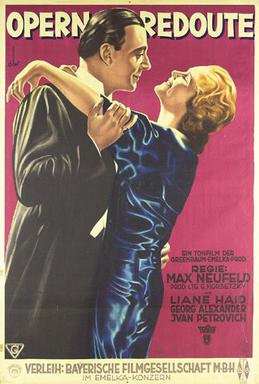Related Research Articles

Juliane "Liane" Haid was an Austrian actress and singer. She has often been referred to as Austria's first movie star.

The White Horse Inn is a 1926 German silent comedy film directed by Richard Oswald and starring Liane Haid, Max Hansen, and Henry Bender. It is based on the play The White Horse Inn by Oskar Blumenthal and Gustav Kadelburg.
Dance Music (German:Tanzmusik) is a 1935 Austrian drama film directed by Johann Alexander Hübler-Kahla and starring Liane Haid, Gusti Huber and Hermann Thimig.

The Opera Ball is a 1931 German musical comedy film directed by Max Neufeld and starring Iván Petrovich, Liane Haid and Georg Alexander. It was shot at the Halensee Studios in Berlin. The film's sets were designed by the art directors Karl Weber and Erich Zander. It was part of a large group of operetta films made during the decade, although he film is not based on the operetta Der Opernball. The following year it was remade in French as Beauty Spot. A 1932 British remake After the Ball was also made.

The Lady in Black is a 1928 German silent film directed by Franz Osten and starring Liane Haid, Marcella Albani and Charles Lincoln.
The Dollar Princess and Her Six Admirers is a 1927 German silent film directed by Felix Basch and starring Liane Haid, Georg Alexander, and Elisabeth Pinajeff.
Explosion is a 1923 German silent film directed by Karl Grune and starring Liane Haid and Carl de Vogt. It was shot at the Marienfelde Studios in Berlin.

Madame Wants No Children is a 1933 Austrian-German comedy film directed by Hans Steinhoff and starring Liane Haid, Georg Alexander and Lucie Mannheim. It is a remake of the 1926 silent film Madame Wants No Children. It was shot at the Sievering Studios in Vienna. The film's sets were designed by the art directors Otto Erdmann, Hans Sohnle and Emil Stepanek.
When I Came Back is a 1926 German silent film directed by Richard Oswald and starring Liane Haid, Max Hansen, and Henry Bender. The film is a sequel to The White Horse Inn (1926) and is based on the play Als ich wiederkam.

Twice Married is a 1930 German comedy film directed by E. W. Emo and starring Liane Haid, Ralph Arthur Roberts, and Lucie Englisch.
The Tragedy of Castle Rottersheim is a 1916 Austrian silent drama film directed by Jacob Fleck and Luise Fleck and starring Hermann Benke, Liane Haid and Cordy Millowitsch.

Hermann Benke (1866–1937) was an Austrian stage and film actor. He made a number of appearances in silent films, co-starring with the rising actress Liane Haid in productions by Wiener Kunstfilm.

With Heart and Hand for the Fatherland is a 1915 Austrian silent war drama film directed by Jacob Fleck and Luise Fleck and starring Hubert Marischka, Hermann Benke and Liane Haid. The composer Franz Lehár, better known for his operetta, created a score to accompany the film during screenings.
With God for Emperor and Empire is a 1916 German silent war drama film directed by Jacob Fleck and Luise Fleck and starring Hermann Benke and Liane Haid. The celebrated operetta composer Karl Michael Ziehrer wrote a score to accompany the film at screenings.
On the Heights is a 1916 Austrian silent drama film directed by Jacob Fleck and Luise Fleck and starring Liane Haid, Hermann Benke and Wilhelm Klitsch.
Summer Idyll is a 1916 Austrian silent drama film directed by Jacob Fleck and Luise Fleck and starring Liane Haid, Hermann Benke and Max Neufeld.
The Woman in White is a 1921 Austrian silent drama film directed by Max Neufeld and starring Liane Haid, Dora Kaiser and Eugen Neufeld. It is based on the 1860 novel The Woman in White by Wilkie Collins.
Rigoletto or The King Amuses Himself is a 1918 Austrian silent historical film directed by Jacob Fleck, Luise Fleck and starring Wilhelm Klitsch, Hermann Benke and Liane Haid. It is based on the 1832 play by the French writer Victor Hugo. To recreate the look of Paris in the early sixteenth century, location shooting took place at the neo-Gothic Vienna City Hall.
The Black Hand is a 1917 Austrian silent crime film directed by Liane Haid, Max Neufeld and Hermann Benke.

Lebenswogen is a 1917 Austro-Hungarian silent film directed by Jacob Fleck and Luise Fleck and starring Wilhelm Klitsch, Liane Haid and Hermann Benke. The term "lebenswogen" translates to "life waves".